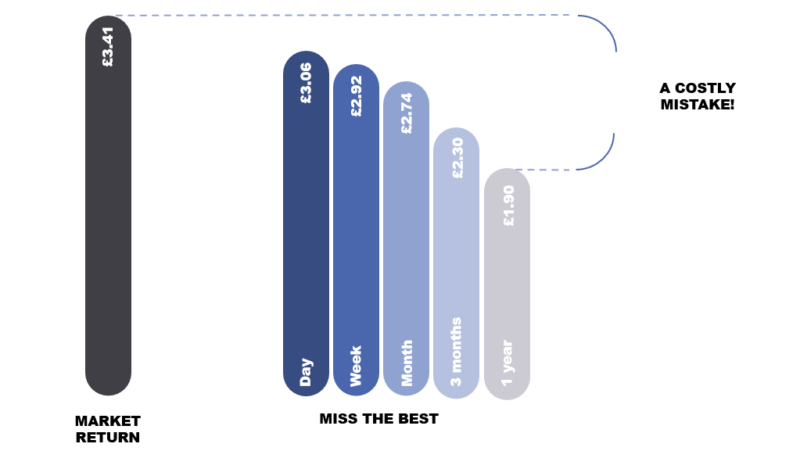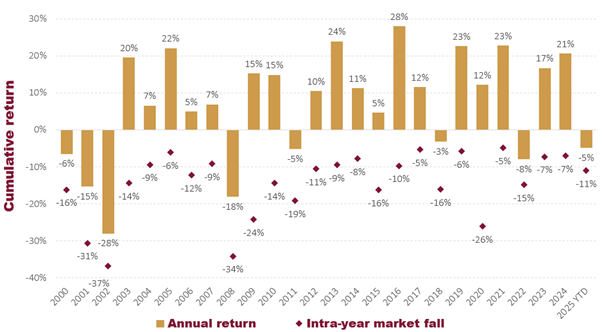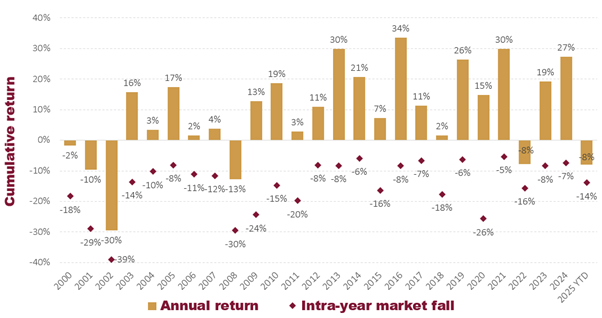It would be an understatement to say the world feels a little unsettled currently. After making a positive start to the year where further record highs were set in January and February, the global stock market has since been on a downward trend due to concerns over a global trade war caused by Donald Trump’s tariff policy. The latest tariff announcements on Wednesday were far worse than markets expected, triggering this latest round of global stock market falls.
Read any paper, or open any news app on your phone, and you won’t have to search too hard to find a sensationalist headline about what is going on in the markets today.
It helps to take a step back from the media frenzy, and remind ourselves exactly what we’re investing in, and why.
Within the growth assets of your portfolio, you own shares in companies (over 12,000 companies, in fact). When you own a piece of a company, you’re staking a claim in the future cash flows of that company. When the company makes a profit, they can distribute this out to owners (such as you) through dividends and/or increases in the share price. These expected future cash flows carry a high degree of uncertainty in their magnitude and timing. Markets are never a smooth ride.
As news reaches the stock markets (as we saw recently with Trump’s tariffs), investors interpret it and adjust their perception of a company’s fair value – perception being the key word here! Positive news can increase investors’ confidence in a company. Negative news has the opposite effect.
Whilst the headlines can understandably be unnerving, it’s important to understand volatility is a normal feature of investing, and there will always be ‘up’ and ‘down’ periods. The recent stock market turbulence is a reminder that investing is no ‘free lunch’.
‘Breaking news’ gets priced into the markets quicker than most investors can react, meaning that most would do well to accept the current stock price as fair. Trying to second guess stock market prices is a game where it’s proven investors are unlikely to win, even though some like to think otherwise!
Here are some reminders to help you navigate times like this, to ensure you make the right decisions, and avoid making bad ones!
Reminder #1 – Avoid trying to time the markets
It can be tempting to ‘wait out the storm’ if you have new money to invest, or to consider moving to cash from an invested position. However, research shows that few investors, whether professional or otherwise, possess any ability to successfully time when to be in or out of markets. The risk of trying to do so can be extremely costly, as the graphic below demonstrates.
The risk of trying to time the market

Source: Albion Strategic Consulting. Albion World Equity Index. £1 invested Jul-07 to Dec-24. Daily returns in USD.
Reminder #2 – Market falls happen every year
Stock markets regularly have choppy periods. This does not make it easy to remain invested through such bumps in the road, but it is vital to do so. Where markets go from here; nobody truly knows. The release of new information which is, by definition, random, and how it is interpreted by investors will determine this.
The below chart shows historic global stock market returns. The gold bars are the calendar year returns and the ‘dots’ are the lowest valuation that the market suffered in each year. The message being, just because the market has fallen in value, this doesn’t mean we are guaranteed to have a negative year. But it could happen.

Source: Albion Strategic Consulting. Data: Vanguard Glb Stk Idx $ Acc. Data in GBP
Looking specifically at the US stock market, where we’re currently seeing the most volatility, we see exactly the same story.

Source: Albion Strategic Consulting. Data: Vanguard Institutional Index I. Data in GBP
Reminder #3 – We’ve planned for this
Volatility is always inherent in stock markets. Occasional significant and drawn-out stock market falls are a feature of markets, not a flaw. Often, they provide evolutionary moments that provide the spark for future growth. We are, and were, mindful of this when we made our recommendation as to which portfolio was appropriate for you.
We soften the fall in the value of investments through owning exposure to companies around the world (diversification) and an appropriate amount in high quality bonds. That said, falls cannot be avoided entirely.
And we ensure you have enough short term cash to meet your on-going spends for a number of years, so you can ignore the noise, and manage the psychological challenges that investing often throws up.
Helping manage clients through tough market conditions is what we’re here for, and should you wish to chat through your financial plan, please contact your Relationship Manager.
Investment into any portfolio should be regarded as for the medium to long-term.
Past performance is no guarantee of future returns and the value of investments and the income from them are not guaranteed and can fall as well as rise. The returns from your portfolio will fluctuate over time. On encashment of your investment, you may not get back the full amount invested and could lose part or all of your capital.













